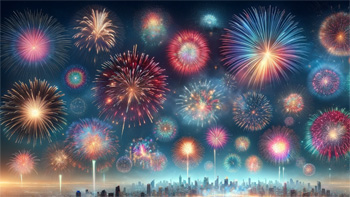 New Year's Day in South Korea
New Year's Day in South Korea


New Year's Day in South Korea, known as 'Sinjeong' (신정), is a significant holiday that marks the beginning of the year on the Gregorian calendar. Celebrated on January 1st, it's a day filled with hope, renewal, and festivity. This special day holds a blend of modern celebrations and traditional customs, reflecting South Korea's rich cultural heritage and its dynamic approach to the new year. In this exploration, we'll delve into the ways South Koreans celebrate New Year's Day, the traditions involved, and the unique aspects that make it an essential part of the country's cultural tapestry.
While South Korea also celebrates the Lunar New Year, known as 'Seollal', New Year's Day on January 1st has its distinct charm and significance. It's a public holiday where people take a break from work to spend time with family and friends, setting the tone for the year ahead.
Family Gatherings and Traditional Customs
One of the core aspects of New Year's Day in South Korea is family gatherings. Families come together to share a meal and spend quality time. A common tradition on this day is the preparation and eating of 'tteokguk', a rice cake soup. Consuming tteokguk is believed to add a year to one's age and bring good luck for the coming year. This dish is more than just food; it's a symbol of good health, prosperity, and a fresh start.
Another important tradition is 'sebae', a deep bow performed by younger members to their elders as a sign of respect and to wish them good health and fortune. In return, elders often give 'sebaetdon', New Year's money, as a blessing. This exchange strengthens family bonds and continues the legacy of respect for elders in Korean culture.
New Year's Celebrations and Events
New Year's Day in South Korea is also marked by various events and celebrations. Major cities like Seoul have vibrant events, including concerts, traditional performances, and fireworks displays. One notable event is the ringing of the Bosingak bell in Seoul, a tradition that includes the ceremonial ringing of the bell at midnight, symbolizing the ushering in of the new year.
In addition to these public celebrations, many South Koreans visit temples and shrines on New Year's Day to pray for good fortune, health, and happiness. The visits to these religious sites are an integral part of the New Year's observances, reflecting the spiritual dimension of the holiday.
Modern Observances and International Influence
In recent years, Western influences have blended with traditional Korean customs to create a unique New Year's celebration. Younger generations in South Korea often enjoy New Year's Eve parties and countdowns, similar to those in Western countries. This fusion of traditions showcases South Korea's ability to blend global influences with its rich cultural heritage.
New Year's Day is also a time for making resolutions and setting goals for the year ahead. It's a day of optimism and looking forward, reflecting the resilience and forward-thinking nature of South Korean society.
New Year's Day in South Korea is more than just the start of a new calendar year; it's a celebration of hope, family, and cultural heritage. As South Koreans honor their traditions and embrace the new year's possibilities, the holiday serves as a reminder of the country's vibrant culture, its values, and the spirit of unity and optimism that characterizes its people.